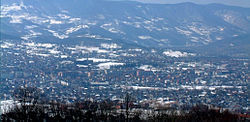Bajina Bašta
|
Bajina Bašta Бајина Башта |
||
|---|---|---|
| Town and municipality | ||

Panoramic view of Bajina Bašta during the winter.
|
||
|
||
 Location of the municipality of Bajina Bašta within Serbia |
||
| Coordinates: 43°57′N 19°33′E / 43.950°N 19.550°ECoordinates: 43°57′N 19°33′E / 43.950°N 19.550°E | ||
| Country |
|
|
| Region | Šumadija and Western Serbia | |
| District | Zlatibor | |
| Settlements | 36 | |
| Government | ||
| • Mayor | Zlatan Jovanović (SRS) | |
| Area | ||
| • Municipality | 673 km2 (260 sq mi) | |
| Elevation | 257 m (843 ft) | |
| Population (2011 census) | ||
| • Town | 9,148 | |
| • Municipality | 25,724 | |
| Time zone | CET (UTC+1) | |
| • Summer (DST) | CEST (UTC+2) | |
| Postal code | 31250 | |
| Area code | +381 31 | |
| Car plates | BB | |
| Website | www |
|
Bajina Bašta (Serbian Cyrillic: Бајина Башта, pronounced [bâjina bǎːʃta]) is a town and municipality located in the Zlatibor District of the western Serbia. The town lies in the valley of the Drina river at the eastern edge of Tara National Park.
The population of the town, according to 2011 census, is 9,148 inhabitants, while the municipality has 25,724 inhabitants.
In 1834 Bajina Bašta was established on the remains of the old Turkish community of Pljeskovo which was situated on the right bank of the Drina River between the Rača and Pilica Rivers, under the east foothills of Tara Mountain. By the end of the 19th century, in accordance with the Serbian-Turkish agreement, the local Muslims had to move from this region directly across the Drina River into Bosnia, where they built settlements in the villages of Skelani and Dobrak.
The name Bajina Bašta comes from the vast orchards and vegetable gardens, that used to be located on the left bank of the Pilica River, which belonged to Turkish feudal owner, Baja Osman, who established the town's modern image in the mid-19th century. In English, the name Bajina Bašta literally means "Baja’s Garden". In 1858 the town became the administrative center of the Rača District. On September 15, 1872, Prince Milan Obrenović IV issued a decree that officially gave Bajina Bašta its status as an officially recognized town. A decade later, Bajina Bašta received its urban plan, long before many places in Serbia.
...
Wikipedia

